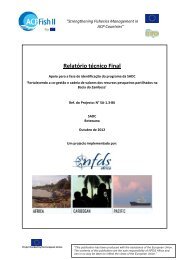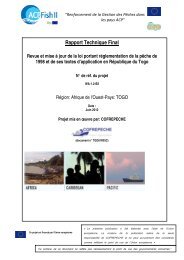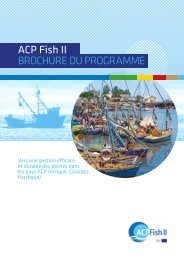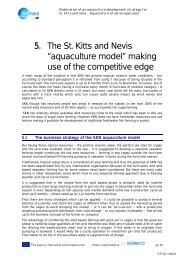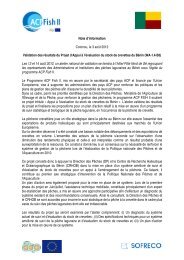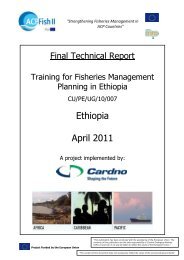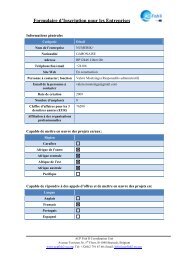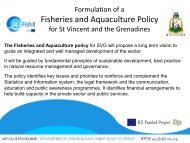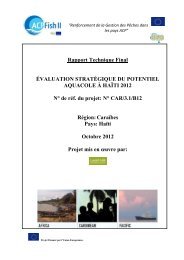Final Technical Report - ACP Fish II
Final Technical Report - ACP Fish II
Final Technical Report - ACP Fish II
You also want an ePaper? Increase the reach of your titles
YUMPU automatically turns print PDFs into web optimized ePapers that Google loves.
<strong>Final</strong> <strong>Report</strong>Megapesca Lda, PortugalVisits to these communities ensured that the assessment includes the two main ethnic groups offishing communities, being Fante (Ghanaian origin) and Kru (Liberian origin). The three countiescovered account for about 50% of the fishing capacity of Liberia’s artisanal sector (in terms ofnumbers of vessels). The Banjor Beach Community is the venue of the important FAO supportedpilot project “<strong>Fish</strong> Post Harvest Technology Platform”. The BNF is also planning the developmentof new fisheries infrastructure (including processing facilities) at Robertsport.4.3 Preparation of Training Needs Assessment StudyThe consultants prepared a structured Training Needs Assessment (TNA) study, based oninformation drawn from the following:review of literature on Liberian fisheries,review of the developments being undertaken by parallel fishery sector interventions (underWorld Bank and FAO),group discussions with the Bureau of National <strong>Fish</strong>eries, Liberian Artisanal <strong>Fish</strong>ermen’sUnion and women operators from fishing communitiesan individual questionnaire survey of 44 women operators in the four fishing communitieslisted above.A comprehensive report analysing the training needs and making specific proposals for the contentand structure of the training of female fishery workers was prepared. This is presented in Annex 3.4.4 Design of training courseThe TNA report was used as the basis for the design of the training programme which aims toestablish and pilot a sustainable entrepreneurial skills training to strengthen the capacity of femalebusiness operators in the fish supply chain to participate more effectively in the development of theLiberian fishery sector.The consultants established a session plan for a 5 day course (4 sessions/day), which addresses theneeds identified in the TNA. The outline content was for each session was also specified. Thisincluded three main areas of instruction:<strong>Fish</strong> handling, processing and quality controlSmall business management and financeHow to be an effective trainer4.5 Preparation of course materialsCourse handbooks were prepared based on the content outlined. Where suitable training materialsand visual aides were available (for example from the EU funded SFP programme) these wereadopted, with modifications where appropriate. The copies of these handbooks are shown in Annex4 (concerning fish handling, processing and quality control) and Annex 5 (concerning business andfinancial management). After approval by the Focal Point in Liberia, the Regional CoordinationUnit and the <strong>ACP</strong> <strong>Fish</strong> <strong>II</strong> Project Management Unit in Brussels, the handbooks were submitted forprinting at the National Printers in Monrovia.The consultants also prepared a 10 page handout on how to be an effective trainer, to provide thecontent relating to the training skills to be developed by the participants. This is shown in Annex 6.<strong>Technical</strong> assistance on Training of Groups of female fishmongers in good sanitary practices and management of small businesses 4



